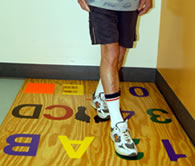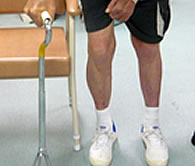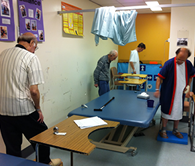Online Balance workshop
Providing clear exercise guidelines to successfully improve balance and prevent falls
The workshop runs as two 4-hour online sessions

Why should people not use their hands for support when doing balance exercises?

Do walking aids prevent falls?

How can therapists help people to ‘challenge’ their balance while being safe?
The online Balance workshop runs for two 4-hour sessions.
The sessions are run at times that suit an Australian or a European timezone. The workshop is run for a maximum of 30 participants. The workshop focuses on analysis of balance, retraining of balance and falls reduction in any population of people that are at risk of falls. The examples of balance analysis and training that are used are of people with a variety of diagnoses including neurological, orthopaedic and frailty.
Target Audience: The workshop will be of interest to physiotherapists, physiotherapy assistants and other health professionals from hospital and community-based settings who work with people with balance problems.
Prior to the first session participants are asked to prepare worksheets revising muscle actions and prior to the second session participants are asked to prepare a case study implementing the principles of balance training discussed in session one.
StrokeEd runs this workshop several times a year, see the workshop calendar to register for an upcoming workshop. The workshop can be run for individual clinical sites or organisations, please contact us if you are interested in running this workshop.
General Information
This balance workshop has been developed following the work by Professor Cathie Sherrington and colleagues that provides clear exercise guidelines to successfully improve balance and prevent falls. Despite this evidence, implementing these guidelines in clinical practice continues to be a major clinical challenge. Therapists have asked the StrokeEd collaboration about how to implement effective balance strategies that are challenging, of sufficiently high dosage and safe. This workshop aims to assist clinicians to develop evidence-based solutions for people with balance difficulties.
Who can attend?
The workshop will be of interest to physiotherapists, physiotherapy assistants and other health professionals from hospital and community based settings who work with people with balance problems.
Objectives
At the completion of the workshop, participants should be able to:
Define
balance, postural adjustments, kinematics, kinetics, task specificity
Discuss
research about the characteristics of postural adjustments i.e. timing, task specificity
Describe
changes that occur to postural adjustments with aging and neuropathology
Describe
the assessment and analysis of balance impairment
Describe
the risk factors, and circumstances of falls
Discuss
the evidence for exercise interventions to improve balance and reduce falls
Describe
how to set up effective balance training for people with impaired balance
Presenters
Workshop Timetable
Session One
| Topic | Format |
|---|---|
| Postural adjustments/ balance research | Lecture 1 |
| Clinical implications of the research | Small group work |
| Assessment/ analysis of balance | Lecture 2 |
| Video analysis | Small group work |
| Intervention – effective balance exercises, dosage, environment set-up | Lecture 3 |
| Changes to usual practice and planning for training videos | Discussion |
Session Two
| Topic | Format |
|---|---|
| Effect of ageing and neuropathology on postural adjustments | Lecture 4 |
| Assessment/ analysis of balance | Lecture 5 |
| Clinical implications of the research | Small group work |
| Analysis and training of patients | Small group work |
| Discussion of analysis and training session and goal setting for changes to practice | Discussion |
Comments
Comments from participants of previous workshops:
Zoom has been great – in Ireland, wouldn’t have had the opportunity to join in without it
The ability to go away between sessions and put it into practice was really beneficial.
Thank you for a great workshop! It’s been fantastic! I look forward to the next one!
Thank-you – lots of learning points to take away
My biggest takeaway is the dosage and number of reps



